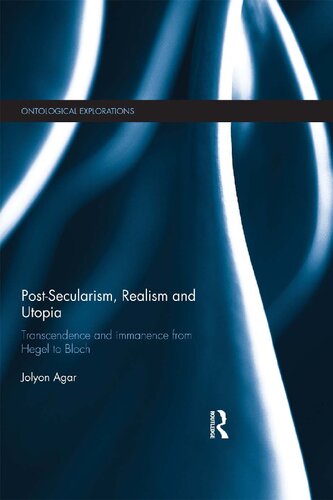

Most ebook files are in PDF format, so you can easily read them using various software such as Foxit Reader or directly on the Google Chrome browser.
Some ebook files are released by publishers in other formats such as .awz, .mobi, .epub, .fb2, etc. You may need to install specific software to read these formats on mobile/PC, such as Calibre.
Please read the tutorial at this link. https://ebooknice.com/page/post?id=faq
We offer FREE conversion to the popular formats you request; however, this may take some time. Therefore, right after payment, please email us, and we will try to provide the service as quickly as possible.
For some exceptional file formats or broken links (if any), please refrain from opening any disputes. Instead, email us first, and we will try to assist within a maximum of 6 hours.
EbookNice Team

Status:
Available4.7
29 reviewsThis book explores the contribution to recent developments in post-secularism, philosophical realism and utopianism made by key thinkers in the Hegelian tradition. It challenges dominant assumptions about what the relationship between religion and our so-called "secular age" should be that have sought to reduce or even eliminate religiosity from the public sphere. It draws upon utopian thinkers within the Hegelian tradition whose work has challenged this narrow secularism. In particular it explores the importance of philosophical transcendence to Hegelian and post-Hegelian religious, social and political theorising. This includes philosophers whose thinking is sympathetic or at least compatible with transcendence (such as Hegel, Taylor, Bhaskar and Bloch) but also those who have a reputation for rejecting transcendence and instead embracing immanence and even atheism (Feuerbach, Marx and Engels). By drawing on the utopian content of these thinkers it seeks to shed new light on the importance religious ideas have played in a range of philosophical positions within the broadly Hegelian tradition from theism, idealism, materialism and atheism to new ideas, especially new research on Hegel's so-called "panentheism".
The book will be of interest to those working in the areas of post-secularism and utopian studies. It should also be of interest to academics and students of the recent turn within Critical Realism to "meta-reality" and its implications for Hegelianism and Marxism.